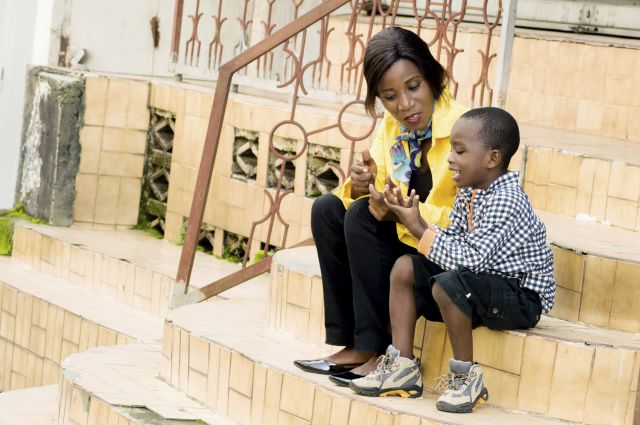Kids spend an average of seven hours each day on electronic devices, like computers and TV, which means there’s a good chance they’re tuning in to the news. Violence in the news is nothing new, but studies show that too much exposure can cause fright, worry and aggression in kids. How should parents talk to their kids about violence in the news? It can be a tricky topic, says adolescent medicine specialist, Elizabeth Ucheoma-Cofield, MD of Medical City Green Oaks Hospital in Texas.
“As a parent, your entire goal is to emphasize the fact that you will keep them safe and that sometimes bad things happen, but people are working for all of us so that we're all safe,” says Dr. Ucheoma-Cofield.
Younger children don’t realize how emotionally impactful TV really is. Exposure to violence can be stressful for anyone to witness, but it’s important for parents to understand that their child’s age can change how they interpret what they’re seeing.
Signs your child may be affected by disturbing news.
When it comes to showing signs of stress, kids may react very differently depending on their age. Before age seven or eight, it’s hard for kids to distinguish between reality and fantasy. If your kids’ behaviors start to change, then they might be watching too much news violence. “You’ll either see them acting out in ways that simulate the things that they've heard, or they’ll have a heightened fear response or an anxiety response, like sleep problems or bed wetting,” says Ucheoma-Cofield.
When kids are around seven or eight years old, they begin to distinguish between what is reality and what is in their imagination, says Ucheoma-Cofield. This is the time you can start having conversations with them about violence in the news.
As kids get older, their response to violence exposure may change. Here are some red flags to look out for:
- Fear of being alone
- Regressive behaviors
- Irritability or sadness
- Eating and sleeping problems (like decreased appetite or nightmares)
- Withdrawal from peers and activities
- Aggression towards authority
- School avoidance
- Physical symptoms (headaches, stomachaches, dizziness)
How parents can help kids cope with news violence
Children rely on the support of parents to help them deal with their emotions during and after traumatic events. Here are some ways parents can help kids cope.
- Break the news: When something happens that will get a lot of coverage, consider telling your child about what’s happened. It might be better that they find out from you instead of another child, a television news report or a social media post. Give them factual information to avoid misconceptions or rumors.
- Listen and allow them to ask questions: Make sure to focus your attention completely when talking with your child about how they’re feeling. It’s very important to explain the events in a way that your child can understand. Your choice of words, concepts and explanations should fit the child’s age, language and developmental level.
“For younger children less than 8 years old, use very simple explanations with simple language. As the child gets older, parents can use slightly more complex language because children at this age have the capacity of reasoning,” says Ucheoma-Cofield. “With adolescents, you can have a very educated conversation with them regarding these topics because they have complex reasoning capacity, have life experiences to draw from, and generally desire more substantive answers to their questions.” - Stay calm: Children are aware of adults’ anxiety and stress. How you are feeling will impact how your child responds. Share your feelings, but do so in moderation so your child doesn’t become overwhelmed.
Children really mirror their parents a lot, especially the younger they are,” says Ucheoma-Cofield. “The healthier you are as a parent, the more that you feel that you can create a safe, loving and nurturing environment for your child, the more that they will bloom and blossom and do great.” - Reassure them: It’s important for parents to reassure their children that events like this are sad, but unusual. Reassure them that you’ll do everything you can to keep them and their loved ones safe. “That interpersonal interaction is really what makes kids feel safe at the end of the day, no matter what the stressor is,” says Ucheoma-Cofield.
- Take care of yourself, too: It’s important to let your kids know that you’re there for them in difficult times. However, talking about and experiencing difficult news and tragedies can be exhausting. Carve out time to take care of yourself, so that you can give your child the attention they need, too. Turn off the news for some quality family time or take a break and do an activity you enjoy, like going for a walk.
As parents, it’s natural to want to protect your child from traumatic events they may see on the news. However, having these conversations with your child can help show them how to deal with tough situations, and can help you both bond during difficult times.






